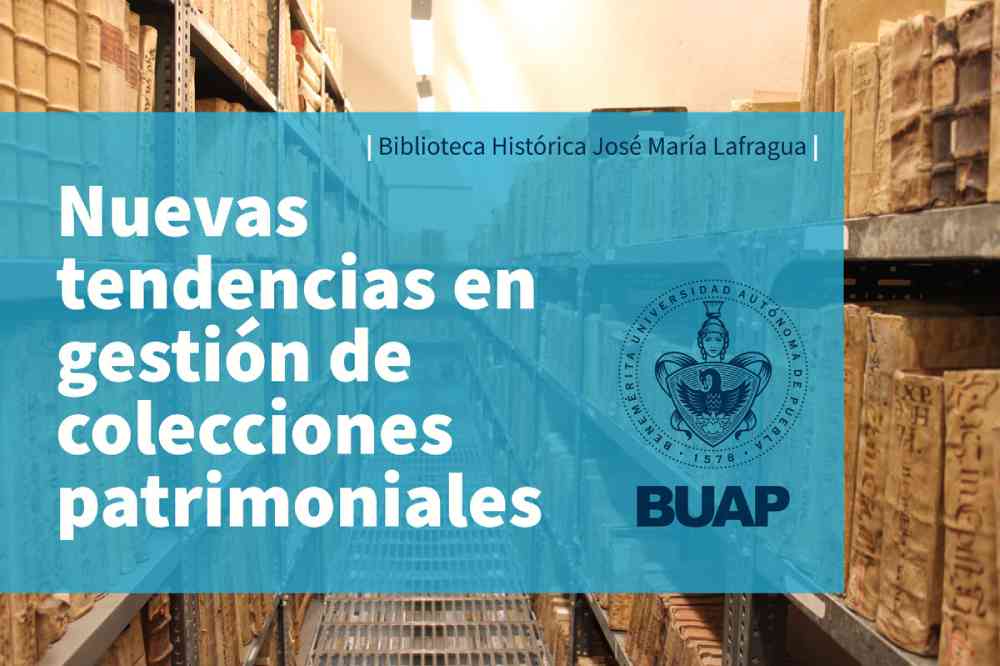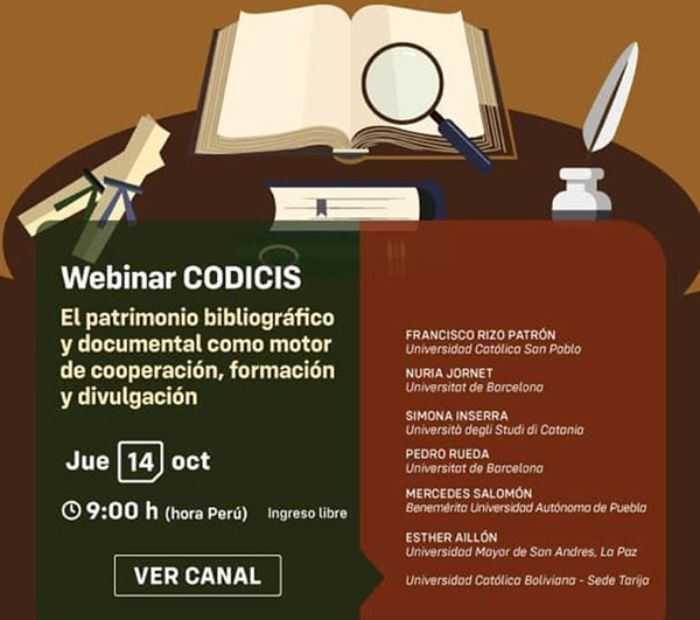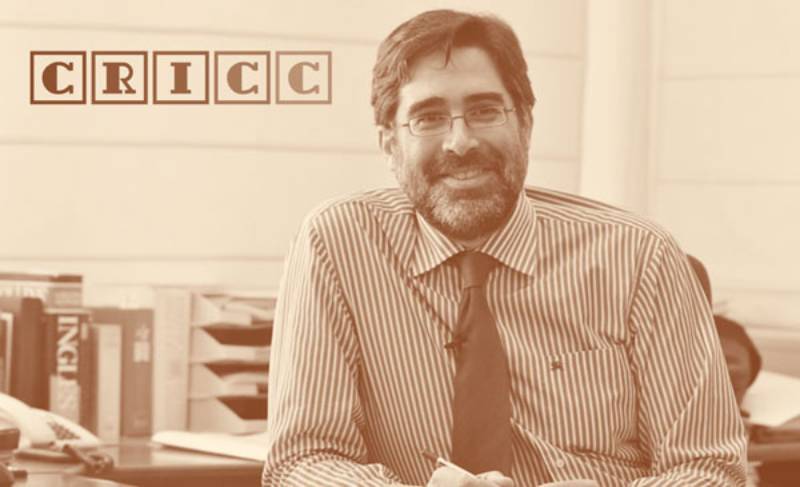
On May 18 and 19, 2022, a colloquium on New trends in heritage collection management will take place at the José María Lafragua Historical Library of the BUAP.

On May 18 and 19, 2022, a colloquium on New trends in heritage collection management will take place at the José María Lafragua Historical Library of the BUAP.

This year, the training course in management and conservation of archives and heritage libraries of the CODICIS project is being developed in Peru, Bolivia and Mexico.

On October 14, 2021, the CODICIS team held a Webinar on the occasion of Erasmus Days.

The Information, Communication and Culture Research Center (CRICC), of the University of Barcelona, organizes meetings with specialists and presents advances in the research of its members.

From October 27 to 29, 2021, the First International Conference on Heritage Archives and Libraries took place.

The Good Practices Conference, held throughout the month of October 2021 and broadcast through YouTube, was highly praised by the audience due to the interest in the topics covered and their transferability.

Within the framework of the international project Codicis, which is financed by the European Union
In order to improve the protection of the documentary heritage in Arequipa, the San Pablo Catholic University (UCSP), carried out the training course for trainers in management and conservation of archives and heritage libraries. This training is part of the international project codicis, led by UCSP and financed by the Erasmus+ program of the European Union.
The course seeks to have more specialized personnel who understand the value of ancient documents and texts and know how to handle them, since it is the first thing required for their conservation and management. It was aimed at members of San Pablo who were instructed by experts from Spain and Italy for 5 months, from September 2022 to January 2023.
The topics they discussed were: history of the book, digitization of ancient texts, preservation and conservation of bibliographic and heritage material; and management of heritage centers. The sessions were hybrid (virtual and in-person) and included theoretical and practical activities.
There were 9 participants in the training. They will be instructors in the replication courses contemplated by the Codicis project, along with other specialists from the partner universities of this initiative. In these replication courses, librarians and archivists from different cities in the country will be trained, who will receive scholarships to be part of this training.
The graduates of the course are Enrique Briceño Medina, director of the UCSP Library, Carmen Chávez Núñez, Edwin Montes Fernández, Tania Ramírez Cabrera, Henry Vílchez Chávez and Justo Noguera Almanza, staff from the same area; Patricia Calvi de Quintanilla and Lucía Galdos Arenas, director and administrator of the San Pablo Editorial Fund, respectively; and Andrea Ocampo Maceda, teaching assistant at the same university.
Codicis is a project that brings together 9 institutions from Peru, Bolivia, Mexico, Spain and Italy, seeking to strengthen capacities for the recovery and conservation of documentary and bibliographic heritage in Latin America and is being carried out under the leadership of the Center for Peruvian Studies of the Saint Paul.
The other partner institutions with the UCSP are: University of Piura (Peru), the Benemérita Autonomous University of Puebla and University panameric (both from Mexico), the Universities Mayor of San Andrés and Bolivian Catholic Saint Paul (both from Bolivia) and the universities of Barcelona and Incoma (both from Spain) and Catania (Italy).
“The Codicis project is concerned with the protection of heritage and culture, which helps us understand our identity as Peruvians. The training time has been hard work, now our graduates have the task of training more people to protect our documentary heritage,” said Mgtr. Pamela Cabala, coordinator of the Codicis project and director of the Center for Peruvian Studies at UCSP.
For his part, the rector of San Pablo, Alonso Quintanilla, highlighted the importance of the Codicis project, as it is the largest among all those that this university executes together with the European Union. “San Pablo is very committed to this initiative, as it makes us come back into contact with books from another perspective, a scientific and poetic perspective,” he said after congratulating the graduates of the training course and asking them to make their efforts pay off. fruits in favor of the cultural heritage of the region and the country.
The second part of the Codicis project includes the implementation of a conservation and restoration laboratory among the affiliated universities. It should be noted that San Pablo already has this environment, which, together with the digitization laboratory of 2014, has been working on the rescue of collections of ancient documents and texts.
It should be noted that the UCSP already has experience in this work, as it has cataloged and digitized historical newspapers such as La Bolsa, El Republicano, El Deber, the correspondence of former president José Luis Bustamante and Rivero, and has new projects underway.
The graduation ceremony took place in the facilities of the Víctor Andrés Belaúnde Library of San Pablo. The UCSP Research Director, Dr. Patricia Castillo Araníbar, also participated in this activity.
Arequipa, May 10, 2023
See original note: Here

Course was held in San Pablo within the framework of the international project Codicis
Specialists from the University of Barcelona and the University of Catania arrived at the San Pablo Catholic University (UCSP) in January 2023. They taught classes and held training workshops, within the framework of the international project Codicis, which seeks to strengthen capacities for the recovery and conservation of documentary and bibliographic heritage in Latin America.
Berta Blasi, expert in Conservation and Restoration of Graphic Documents, and Simona Inserra, researcher in Archival Science and Library Science, participated from the University of Catania. Also, Miquel Térmens, dean of the Faculty of Information and Audiovisual Media and Jesús Gascón García, graduate in Documentation, both from the University of Barcelona.
They discussed conservation, digitization of ancient documents and the history of the book. San Pablo personnel who work in areas related to the management and production of books and other texts and personnel from the University of Piura, who also arrived in Arequipa for this course, received the training for 10 days. Both study houses make up the Codicis project in Peru. Similar courses have been held in Bolivia and Mexico, partner countries of this initiative.
San Pablo is the leading university of this initiative that brings together 9 institutions from Europe and Latin America. It is co-financed by the European Union (EU) through the Erasmus+ program. Its development is possible thanks to the fact that this academic institution won one of the EU calls. Currently, it is in its third year of execution.
The UCSP professor and project coordinator, Francisco Rizo Patrón, explained that this first training was for personnel from the partner universities in Peru, because it is the prelude to the training course that will be carried out with personnel from other institutions that work with documentary heritage. and ancient texts. This course will be held this year in Arequipa. Participants will be selected and will receive an invitation to apply, as there will be no cost.
He also specified that it is a complete training, since the management of documentary heritage does not only imply its digitization, that is, transferring physical texts to virtual formats, as is usually thought, but also requires a series of previous steps, as well as actions that bring this material closer to the population so that they know how to value it.
In the course carried out at the UCSP, use was also made of the new conservation and management of heritage collections laboratory at San Pablo, and visits were made to archival and library heritage centers in our city.
In addition to the partners from Peru, Spain and Italy, the Benemérita Universidad Autónoma de Puebla and the Universidad Panamericana, both from Mexico, are part of Codicis. The universities Mayor de San Andrés and Católica Boliviana San Pablo and Incoma, a Spanish research and research consultancy, are part of Bolivia.
Arequipa, February 2023
See original note: Here
Conversando con is a program produced by the San Pablo Catholic University (UCSP) in which specialists who visit the UCSP are interviewed. This edition included the participation of Mercedes Salomón Salazar, director of the 'José María Lafragua' historical library, of the Benemérita Autonomous University of Puebla (Mexico) and Gerardo Trillo Auqui, expert in Library Science, with vast experience in the National Library of Peru.
Both specialists arrived at San Pablo in November 2023, within the framework of the project's International Symposium. codicis, which seeks the preservation of documentary heritage, through the training of personnel for its management, recovery and conservation. This event was part of UCSP Research Week.
In this interview broadcast in February of this year they discussed the value of heritage documentation and its digitization.

The Mexican professor explained the work of UNESCO's Memory of the World Program, which provides international, regional and national recognition to each historical record in order to preserve documentary heritage.
Within the framework of the “Regional Symposium on Conservation and Management of Documentary Heritage (Archival and Bibliographic): Good Practices and Current Possibilities”, Dr. Gerardo Zavala Sánchez, coordinator of the degree in Library Science and Information Studies at the National Autonomous University of Mexico, presented the presentation “Unesco Memory of the World Program: an experience from the Mexican vision.”
He explained that the memory of the world refers to the collective and documented memory of people. This heritage represents a part of the cultural heritage of humanity and is the legacy that ancestors have left to present and future communities.
Currently, said Dr. Zavala, documentary heritage is important because documentation gives identity to society and is an example of the existence and sociocultural development of people. For this reason, he noted, many institutions have been raising awareness about these documents that are being destroyed and that must be preserved for posterity.
In that sense, he said that the UNESCO program aims to give importance and recognition at the international, regional and national level to each heritage record or document that is registered.
To do this, it disseminates the registered heritage through events, awareness campaigns and alerting public powers, communities, citizens, business and commercial sectors about the need to preserve this historical documentation, he said.
Likewise, he maintained that, in the program, the concept of documentary heritage not only includes printed manuscripts and monographs, which are found in libraries and archives, but also all documents that are in audiovisual, digital, etc. media.
For example, in Mexico there is a Mexican Memory of the World Committee with which 14 records have been achieved at the international level, 28 at the regional level and 74 at the national level, Zavala commented.
As final reflections, Master Cristina Vargas, director of International Relations, indicated that these two days of activities of the regional symposium have left important learnings such as new reflections on heritage, the idea of unarchiveing while being respectful of the methodologies and archival work of the library to make documentation accessible and more inclusive, and the important task of disseminating these documentary archives in order to generate interest and commitment from the communities.
At the closing of the symposium, Dr. Enrique Banús, dean of the Faculty of Humanities, said that with this type of events we are contributing to making palpable how heritage is part of daily life and requires specialized professional dedication, because being Human is a patrimonial being that guards, transmits or deteriorates the patrimony; Therefore, education and heritage awareness are necessary.
“Heritage is not a specific issue for professionals but for all families and communities that have heritage assets, which are important because they tell a story and establish links with the past, with other people and with the next generations,” he said.
November 3, 2022
See original note: Here